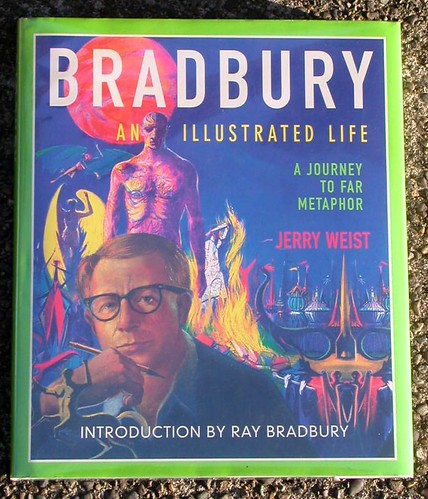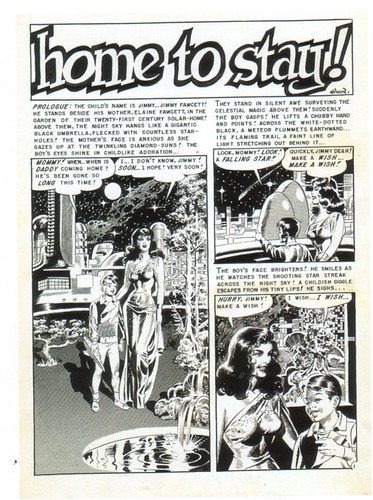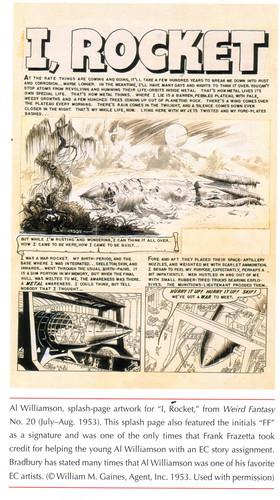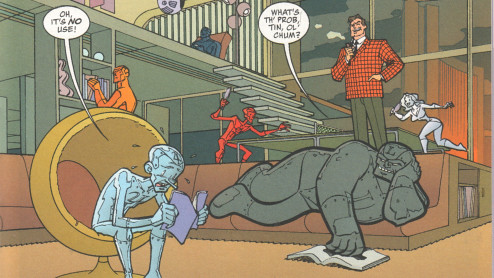Not quite comics: Book "review"

Bradbury: An Illustrated Life (A Journey to Far Metaphor)
By Jerry Weist; William Morrow (2002)
As I was leaving school last week, a colleague handed me this book, saying his wife had picked it up at a sale and he thought I might be interested in it. I was a pretty big fan of Ray Bradbury back in the day, and a look at the graphics associated with his books seemed at least mildly interesting. And it was a big book (which is why I had to take a picture of it on my sidewalk - it was too big for the scanner), so the illustrations were high quality.
Imagine my delight when I found that in the midst of chapters such as "From pulps to slicks" and "The Theater and Ray Bradbury" that chapter four was "EC Comics and Ray Bradbury: The Untold Story..."
I haven't had a chance to read the chapter thoroughly, but it describes the association between Bradbury and Bill Gaines, EC's publisher, that grew after Bradbury discovered some plagiarized material in the comic books Haunt of Fear, Vault of Horror, and Weird Fantasy. Instead of the litigation that would probably follow today, Bradbury both got his due for the "stolen" work and pitched some future ideas in charming correspondence with the EC offices. Once a cordial relationship had been established, EC adapted several Bradbury works over the course of the following few years.
The book contains some great samples of artwork from those adaptations; the roster of creators read like a list of nominees for the Comics Hall of Fame.

This is the Wally Wood splash page for the unauthorized adaptation of "Rocket Man" and "Kaleidescope" from Weird Fantasy #13 in 1952, the story that started it all. The book contains the following samples of work from Jack Davis and Al Williamson, as well as work from Bernard Krigstein and John Severin.


I guess I was dimly aware the Bradbury stories had been adapted to comics in various forms, but I had no idea of the extent of his relationship with EC.
Not quite comics: Movie "Review"
Comic Book Pajama Party: Women Who Love Comic Books!
Latitude X - 2005
 The Netflix envelope for this movie reads, in part: Meet eight beautiful, intelligent and fun young women who also happen to be huge comic book fans. Gathering together one evening to talk about the comic books they love -- and hate -- these gals lounge, eat chocolate, guzzle wine, and give you the low-down [...] Be a fly on the wall as these smart, savvy and outspoken chicks dish about more than just pop culture.
The Netflix envelope for this movie reads, in part: Meet eight beautiful, intelligent and fun young women who also happen to be huge comic book fans. Gathering together one evening to talk about the comic books they love -- and hate -- these gals lounge, eat chocolate, guzzle wine, and give you the low-down [...] Be a fly on the wall as these smart, savvy and outspoken chicks dish about more than just pop culture.I wish that I could recommend this documentary; it would be nice to have a decent resource in the ongoing discussion of "women and comics" that seems to be part and parcel of the comicsweblogosphere these days. Unfortunately, this is a really crappy film.
It begins with a self-introduction by each of the participants, filmed in a comics store; each woman gives a quick thumbnail of her interests and (for some undisclosed reason) answers the question "Are ninjas cool?"
After all the players are introduced, the scene shifts to an apartment. All the women are there, in various sorts of jammies*, doing what passes for pajama party stuff when all the attendees are strangers to each other and there is a camera crew in the room. They show each other comics, play with action figures, have earnest discussions with polite disagreements, eat, drink, and so on. About halfway through the film, a splinter group separates and goes upstairs to a bedroom to talk about anime and manga while the main crew stays in the living room to talk about American comics (but not just the big two). And then the film closes with a game of Twister.
The production values are awful. Besides shaky and undistinguished camera work, the sound is all out of balance and the volume level changes randomly. More importantly, there is no artfulness or even coherent design to the editing; conversations are captured in all their rambling and incoherent glory, and there is no arc to the discussion or apparent intent to the film. Other than some narration at the beginning, the documentarians' efforts are seen only in the on-screen captions, which either elaborate on information given or give superfluous scene summaries; otherwise, this could have been random scraps of film from a home video found on a subway platform.
Try as I could to glean some data from this mess, I felt it was pretty much a waste. Here's what I learned:
- The filmmakers think that girls didn't use to read comics, but that now they do. (This contradicts some readership figures I have seen about comics readers in the forties.)
- Almost all of the women thought that huge-breasted comics women were stupid, silly, and juvenile; I don't think any of them called the images "offensive." (They spent some time discussing the topic.)
- Many of the women expressed an enjoyment of the action or violence that is part of the superhero genre, but only one seemed to really like gore.
- Most of the women said it was well-written stories that kept them reading comics.
Not much silver for so much dross. Unless you are a real completist on the subject, I don't think that Pajama Party is worth seeking out.
*The one thing I can categorically state about the film is that, beyond choosing the conceit of a slumber party as the backdrop for the discussion (I mean, couldn't it have been a luncheon or something?), I didn't see a lot of sexism or sexuality in the film. The women are all dressed modestly and appropriately in comfy clothes (sweatpants, what we used to call "hostess pajamas," and the like), there is no cheesecake or gratuitous camera work, and even the Twister game is more sisterly than sexy. In fact, the best thing about the film is the women - I wish I could actually get to meet them and hear what they have to say, instead of seeing them through the muddy lens of this movie, because they all seemed like "intelligent and fun young women."
Last note: While watching this, my partner (before she left the room out of boredom and annoyance) asked me if any of the women were bloggers I read. I have to say, that after seeing the names and capsule bios, I don't think so, but who knows? As the New Yorker cartoon said, on the internet, no one knows you're a dog.



1 comment:
The female readership of comics since their start could always be confirmed empirically; it's just that people whose existing biases are contradicted by the facts never bothered to do so.
I always knew my mom read comics back in the Forties; when I got involved with Legion of Super-Heroes fandom in the Seventies it was fifty percent female, as was the reader correspondence Mort Weisinger published in Adventure Comics in the early Sixties; and every girlfriend I've ever had (bar one) was a comics reader, and only one of those had been introduced to comics by an earlier boyfriend while the rest picked them up on their own. So for me it was always a non-issue, something I took for granted, and discussions of "why don't girls read comics?" or "how do we get more girls to read comics?" have always given me a headache.
Post a Comment